专业学位硕士研究生英语教程09
研究生英语阅读教程(基础级3版)课文09和其翻译
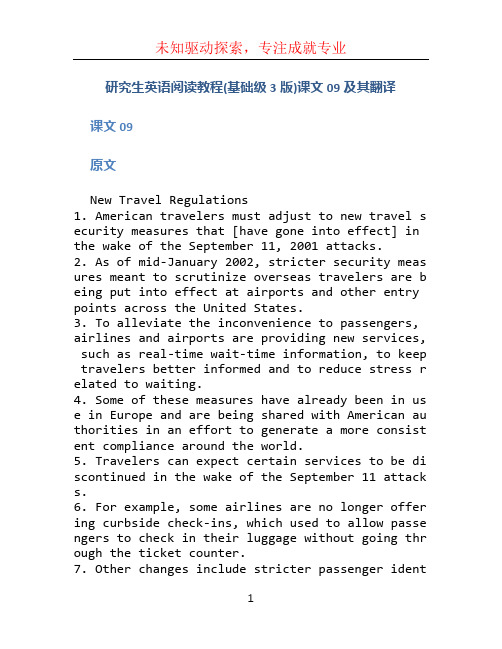
研究生英语阅读教程(基础级3版)课文09及其翻译课文09原文New Travel Regulations1. American travelers must adjust to new travel s ecurity measures that [have gone into effect] in the wake of the September 11, 2001 attacks.2. As of mid-January 2002, stricter security meas ures meant to scrutinize overseas travelers are b eing put into effect at airports and other entry points across the United States.3. To alleviate the inconvenience to passengers, airlines and airports are providing new services, such as real-time wait-time information, to keep travelers better informed and to reduce stress r elated to waiting.4. Some of these measures have already been in use in Europe and are being shared with American au thorities in an effort to generate a more consist ent compliance around the world.5. Travelers can expect certain services to be di scontinued in the wake of the September 11 attack s.6. For example, some airlines are no longer offer ing curbside check-ins, which used to allow passe ngers to check in their luggage without going thr ough the ticket counter.7. Other changes include stricter passenger identifications' requirements and more thorough inspec tions of checked luggage.翻译新旅行规定1. 在2001年9月11日袭击事件之后,美国旅行者必须适应新的旅行安全措施。
研究生英语综合教程(上)Unit9_TextB
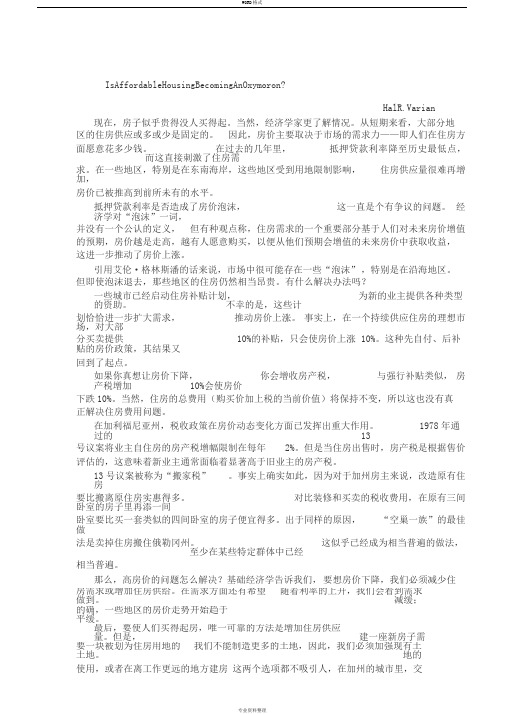
IsAffordableHousingBecomingAnOxymoron?HalR.Varian现在,房子似乎贵得没人买得起。
当然,经济学家更了解情况。
从短期来看,大部分地区的住房供应或多或少是固定的。
因此,房价主要取决于市场的需求力——即人们在住房方面愿意花多少钱。
在过去的几年里, 抵押贷款利率降至历史最低点, 而这直接刺激了住房需求。
在一些地区,特别是在东南海岸,这些地区受到用地限制影响, 住房供应量很难再增加,房价已被推高到前所未有的水平。
抵押贷款利率是否造成了房价泡沫, 这一直是个有争议的问题。
经济学对“泡沫”一词,并没有一个公认的定义, 但有种观点称,住房需求的一个重要部分基于人们对未来房价增值的预期,房价越是走高,越有人愿意购买,以便从他们预期会增值的未来房价中获取收益,这进一步推动了房价上涨。
引用艾伦·格林斯潘的话来说,市场中很可能存在一些“泡沫” ,特别是在沿海地区。
但即使泡沫退去,那些地区的住房仍然相当昂贵。
有什么解决办法吗?一些城市已经启动住房补贴计划, 为新的业主提供各种类型的资助。
不幸的是,这些计划恰恰进一步扩大需求, 推动房价上涨。
事实上,在一个持续供应住房的理想市场,对大部分买卖提供 10%的补贴,只会使房价上涨 10%。
这种先自付、后补贴的房价政策,其结果又回到了起点。
如果你真想让房价下降, 你会增收房产税, 与强行补贴类似, 房产税增加 10%会使房价下跌10%。
当然,住房的总费用(购买价加上税的当前价值)将保持不变,所以这也没有真正解决住房费用问题。
在加利福尼亚州,税收政策在房价动态变化方面已发挥出重大作用。
1978年通过的 13号议案将业主自住房的房产税增幅限制在每年 2%。
但是当住房出售时,房产税是根据售价评估的,这意味着新业主通常面临着显著高于旧业主的房产税。
13号议案被称为“搬家税” 。
事实上确实如此,因为对于加州房主来说,改造原有住房要比搬离原住房实惠得多。
(完整word版)专业学位硕士研究生英语教程09
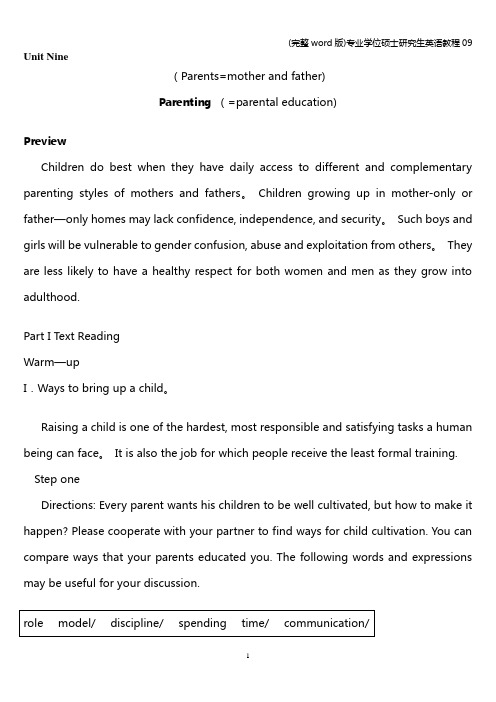
Unit Nine(Parents=mother and father)Parenting(=parental education)PreviewChildren do best when they have daily access to different and complementary parenting styles of mothers and fathers。
Children growing up in mother-only or father—only homes may lack confidence, independence, and security。
Such boys and girls will be vulnerable to gender confusion, abuse and exploitation from others。
They are less likely to have a healthy respect for both women and men as they grow into adulthood.Part I Text ReadingWarm—upI.Ways to bring up a child。
Raising a child is one of the hardest, most responsible and satisfying tasks a human being can face。
It is also the job for which people receive the least formal training. Step oneDirections: Every parent wants his children to be well cultivated, but how to make it happen? Please cooperate with your partner to find ways for child cultivation. You can compare ways that your parents educated you. The following words and expressions may be useful for your discussion.Step twoDirections:If you were a parent, how would you raise your kids?Please discuss this topic with your desk mate。
研究生英语课程unit9
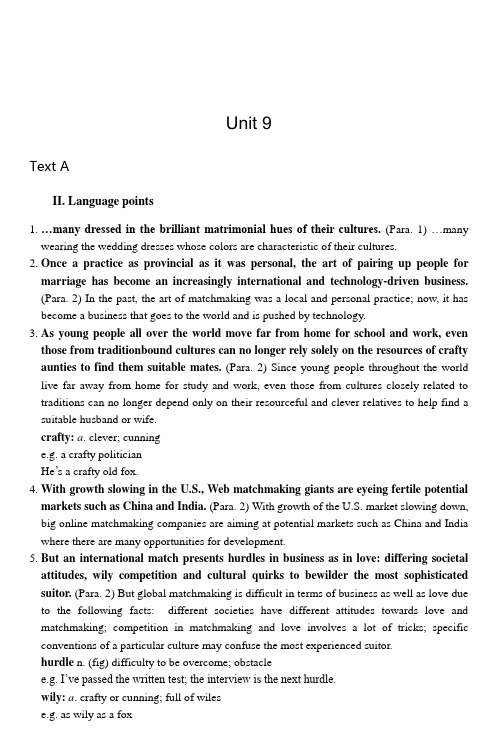
Unit 9Text AII. Language points1. …many dressed in the brilliant matrimonial hues of their cultures.(Para. 1) …many wearing the wedding dresses whose colors are characteristic of their cultures.2. Once a practice as provincial as it was personal, the art of pairing up people for marriage has become an increasingly international and technology-driven business. (Para. 2) In the past, the art of matchmaking was a local and personal practice; now, it has become a business that goes to the world and is pushed by technology.3. As young people all over the world move far from home for school and work, even those from traditionbound cultures can no longer rely solely on the resources of crafty aunties to find them suitable mates. (Para. 2) Since young people throughout the world live far away from home for study and work, even those from cultures closely related to traditions can no longer depend only on their resourceful and clever relatives to help find a suitable husband or wife.crafty:a. clever; cunninge.g. a crafty politicianHe‟s a crafty old fox.4. With growth slowing in the U.S., Web matchmaking giants are eyeing fertile potential markets such as China and India. (Para. 2) With growth of the U.S. market slowing down, big online matchmaking companies are aiming at potential markets such as China and India where there are many opportunities for development.5. But an international match presents hurdles in business as in love: differing societal attitudes, wily competition and cultural quirks to bewilder the most sophisticated suitor. (Para. 2) But global matchmaking is difficult in terms of business as well as love due to the following facts: different societies have different attitudes towards love and matchmaking; competition in matchmaking and love involves a lot of tricks; specific conventions of a particular culture may confuse the most experienced suitor.hurdle n. (fig) difficulty to be overcome; obstaclee.g. I‟ve passed the written test; the interview is the next hurdle.wily:a. crafty or cunning; full of wilese.g. as wily as a foxUnit 9 79bewilder:v. puzzle (sb); confusee.g. The child was bewildered by the noise and the crowds.I am totally bewildered by the clues to this crossword puzzle.sophisticated:a. having or showing much worldly experience and knowledge of fashionable lifee.g. a sophisticated womanwearing sophisticated clothes6. As far back as the Paleolithic era, arranged marriages served to forge networks between family groups, writes Stephanie Coontz in Marriage, a History.(Para. 3) In Marriage, a History, Stephanie Coontz points out that as early as the Paleolithic era, arranged marriages began to help create close ties between family groups.forge:v. (fig) create (usu a lasting relationship) by means of much hard worke.g. forge a bond, a link, an alliance, etca friendship forged by adversity7. Suspicion and disdain eased into acceptance as more Americans found a partner--or at least a date and not a nut —on the sites. (Para. 4) Americans‟ attitude towards online matchmaking changed from doubt and contempt into acceptance because more of them found a mate — or at least a person to have a romantic relationship with rather than a crazy person—on the Internet dating sites.disdain:n. feeling that sb./sth. is not good enough to des erve one‟s respect; contempte.g. a look/tone/expression of disdaintreating other people‟s ideas with disdain8. If a country with little tradition of matchmaking can embrace a version of it online, then it follows that cultures long used to a third party’s hand in love affairs would do the same. (Para. 5)If online matchmaking can be popular in a country like the U.S. with little tradition of matchmaking, then we can logically conclude that cultures with long tradition of arranged marriage by a third party would accept it as well.9. But it has learned along the way that its model does not always translate. (Para. 6) But Match has learned during the course of expansion that its way of matchmaking does not always work well in other cultures.10. On Match, users post personal profiles and photos, attracting and perusing potentialmates in what resembles a colossal bar scene. (Para. 6) On , users post their personal profiles and photos on the Internet, attracting other users and examining carefully the personal profiles and photos of the users they are attracted to in a scene which is like a huge bar.peruse:v. read carefully or thoroughlye.g. peruse a document11. To differentiate itself from local competitors when it launched there in 2003, Match80toned down its window-shopping aspect and played up the promise of long-term love.(Para. 6) In order to distinguish itself from local competitors when it started operations there in 2003, Match made its window-shopping aspect less important and emphasized the promise of long-term love.tone down(cause sth. to) become less intensee.g. She is trying to tone down the colors of the picture.play sth. up try to make sth. appear more important than it ise.g. Some reporters like to play up sensational social news.12. That bodes well for the international hopes of eHarmony, the leader amongcompatibility-focused sites in the U.S. (Para. 7) The social changes and especially the newly pervasive insistence on love as an essential ingredient of marriage are a good sign for eHarmony‟s success around the world because the company is the leading matchmaking site in the U.S. that has been focusing on compatibility research.bode well/ill (for sb./sth.) be a good/bad sign (for sb./sth.)e.g. His idle habits bode ill for his future.These figures do not bode well for the company‟s future.13. That’s not to mention marriages at a rate of 90 a day, unions that so far haveproduced 100 000 children (a disproportionate number of them named Harmony).(Para. 7) In addition, eHarmony helps make 90 marriages every day which up to now have produced 100 000 children (an unusually large number of them named Harmony after the company).disproportionate:a. relatively too large or small, etc; out of proportione.g. We spend a disproportionate amount of our income on rent.14. In China, that means commissioning researchers at Beijing University to find outwhether its model —in which 29 “dimensions” such as humor and spirituality are mined for compatibility —applies to the culture.(Para. 8) In China, eHarmony has appointed researchers at Beijing University to find out whether its model — in which 29 “dimensions” such as humor and spirituality are extracted for the compatibility test — is appropriate for Chinese culture.15. China should be a natural haven for online matchmaking.(Para. 10) China shouldnaturally be an ideal market for online matchmaking.haven:n. place of safety or rest; refugee.g. Terrorists will not find a safe haven here.16. The imbalance of genders brought on by the single-child rule (many parents opted tokeep only a male baby) has also led to a desperate demand for matchmakers among rural men, opening the door to unscrupulous brokers who con women into unions.(Para. 10) The fact that men outnumber women due to the one-child policy (many parents chose to keep only a male baby) has also led to an urgent need for matchmakers amongUnit 9 81marriage-aged single men in the countryside, which gives unethical brokers opportunities to make profit by deceiving women into marriage.unscrupulous: a. without moral principlese.g. unscrupulous methods, behaviorHe was utterly unscrupulous in his dealings with rival firms.con:v. (infml) swindle or persuade sb. after gaining his truste.g. I was conned into buying a useless car.She conned me out of $100.17. Western online matchmakers, however, do face challenges in gaining a foothold in theChinese matchmaking market. (Para. 11) Western online matchmakers, however, do find it difficult to gain a secure position in the Chinese matchmaking market, from which they can make further progress.18. Chinese sites rely instead on online advertising and ticket sales from events such asspeed-dating mixers that charge about $13 for admission (parents who tag along have to pay too). (Para. 11) Instead of subscription fees, Chinese Web dating sites mainly rely on online advertising and ticket sales from events such as speed-dating mixers that require about $13 for admission in which parents who follow their children closely also have to pay.tag along (after/behind/with sb.) follow closelye.g. children tagging along behind their motherIf you‟re going to the cinema, do you mind if I tag along (with you)?19. …his free websites steer users to his 30 off-line matchmaking offices, where they canpay fees totaling up to $6,000. (Para. 11) …after browsing his websites free of charge, users will be guided to his 30 off-line matchmaking offices, where they can pay as much as $6000 for matchmaking.steer:v. direct or control the course ofe.g. steer a boat into the harbor(fig) He managed to steer the discussion away from the subject of money.20. Like China, India has a long history of and cultural comfort with matchmaking;(Para. 12) Like China, India has a long history of matchmaking and matchmaking is generally accepted in its culture.21. Partly because India’s matrimonial sites have already succeeded in wooing the nation,Western companies have hesitated at the door.(Para. 13) Partly because India‟s Web matchmaking sites have already succeeded in obtaining the support of the nation, Western companies have not decided yet whether they should dive into the Indian market.woo:v. try to obtain the support ofe.g. woo the voters22. For instance, sites there make matches on the basis of factors unfamiliar to outsiders,82including caste, language and “character”— a euphemism for chastity. (Para. 13) For example, India‟s matrimonial sites make matches according to factors that people outside India are not familiar with, such as caste, language and "character"—an indirect word for virginity.euphemism:n. (example of the) use of pleasant, mild or indirect words or phrases in place of more accurate or direct onese.g. …Pass away‟ is a euphemism for …die‟.…Pass water‟ is a euphemism for …urinate‟.III. Key to the exercises1. Reading comprehension(1) There are some reasons why the art of pairing up people has become an increasinglyinternational and technology-driven business. On the one hand, since young people all over the world move far from home for school and work, they can no longer only depend on their relatives to find them suitable mates. On the other hand, online marriage and dating sites have multiplied rapidly since they began to appear a decade ago.(2) In the U.S., matchmaking took off as an industry only in this decade, with the arrival ofInternet dating sites. Americans‟attitude towards online matchmaking has gone through some changes. At first Americans distrusted and scorned online matchmaking, but they later accepted it because more Americans found a partner on the dating sites.(3) According to Para. 6, in order to differentiate itself from local competitors, Matchemphasized the importance of long-term love and relied on science to help users find their true love.(4) According to the text, China should be a natural haven for online matchmaking. Firstly, upuntil a century ago, marriage-registration forms required the seal of an “introducer.”Secondly, even today, the off-line matchmaking business remains robust. Lastly, the imbalance of genders has led to a desperate demand for matchmakers among rural men. (5) Western online matchmakers do face some challenges in gaining a foothold in the Chinesematchmaking market. For example, western online matchmakers mainly rely on subscription fees for their revenues, but in China, only a very small number of Internet daters pay subscription fees which are minimal according to the Western standard. If they want to win the Chinese matchmaking market, they have to adjust their subscription-based models to the market.2. VocabularySection A(1) matrimonial (2) privacy (3) multiply (4) flirt (5) browse (6) provincial (7) steer (8) temperament (9) disproportionate (10) havenUnit 9 83Section B(1) B (2) A (3) D (4) C (5) C (6) A (7) D (8) B (9) C (10) A3. Cloze(1) bore (2) gossip (3) share (4) lies (5) informal(6) online (7) visited (8) lead (9) estimated (10) Although(11) mere (12) values (13) but (14) made (15) stuff(16) practically (17) unimaginably (18) originally (19) into (20) on4. TranslationA. Chinese to English1) Translate the following sentences into English.(1) In countries such as the United States and Australia, the sports industry is very lucrative.The money that professional sportsmen make every year is certainly no less than specialist doctors, lawyers or bankers.(2) I strongly reject the idea that people who use “earthy” language are speaking more directlyor with more authenticity than people who employ euphemisms.(3) As time goes by and technological development forges ahead, it will become increasinglyharder to differentiate between mental and manual labour.(4) Increases in physical activity have been shown to be strongly associated with improvingphysical fitness. Therefore, moderate physical activity —even an unhurried 30-minute stroll every day — may diminish the risk for heart disease among the elderly.(5) To take full advantage of the convenience offered by the Information Age, I subscribe to anumber of journals concerned with my subject on the Internet.(6) The best-financed, most technologically powerful companies often bring out their mostadvanced products on their home turf a year or two before they ship them around the world.(7) China and America together account for nearly half of the global energy demand, whichurges the leaders of the two countries to talk about how clean technology may help solve the problem of climate change.(8) Some aspiring young people in big cities like Beijing and Shanghai may opt to remainsingle because they are so busy with work that they don‟t have the time to date and get married.2) Translate the following paragraph into English.Facebook users may feel socially successful in cyberspace but they are more likely to perform poorly in exams, according to new research into the academic impact of the social networking website. The majority of students who use Facebook every day are underachieving by as much as an entire grade compared with those who shun the site. About 83% of British 1684to 24-year-olds are thought to use social networking sites such as Facebook, MySpace and Bebo, to keep in touch with friends and organize their social lives. According to the research, 65% of Facebook users accessed their account daily, usually checking it several times to see if they had received new messages. The amount of time spent on Facebook at each log-in varied from just a few minutes to more than an hour. However,79% of Facebook-using students believed the time they spent on the site had no impact on their work. Facebook said: “There is also acade mic research that shows the benefits of services like Facebook. It‟s in the hands of students, in consultation with their parents, to decide how to spend their time.”B. English to Chinese1) Translate the following paragraph into Chinese.美国的婚恋网站谋求使自己区别于当地竞争对手的一种方法是依靠科学。
全日制硕士专业英语学位研究生教程
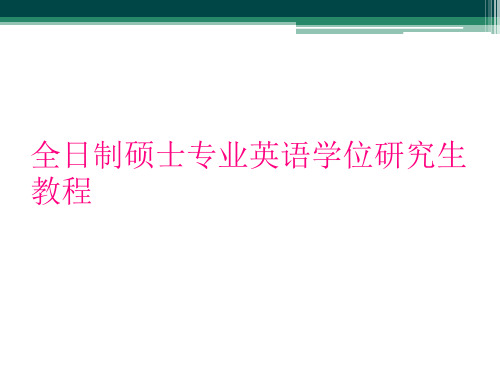
全日制硕士专业学位研究生英语教程
Warm-up Activity
1. What do you know about career planning?
2. Is career planning important to career success?
3. What issues should be taken into consideration in career planning?
全日制硕士专业学位研究生英语教程
Passage Study
1. How many times will you change careers in your lifetime? If you‘re like most people, you’ll change careers at least several times over the course of your life. How successful you’ll be in making transitions among careers can at least be partially attributed to the amount of career planning and preparation you’ve done.
Career Planning is an ongoing career development process through which planners attempt to understand their personal, family, school, work, and community experiences and the importance they may have in making career and lifestyle choices. It incorporates short-term and longterm career goals, personal goals and constraints.
研究生学术英语写作教程Unit 9 referencing
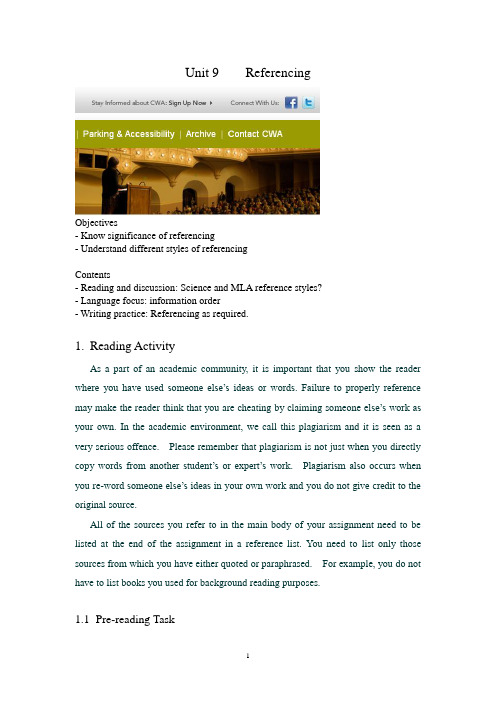
Unit 9 ReferencingObjectives- Know significance of referencing- Understand different styles of referencingContents- Reading and discussion: Science and MLA reference styles?- Language focus: information order- Writing practice: Referencing as required.1.Reading ActivityAs a part of an academic community, it is important that you show the reader where you have used someone else’s ideas or words. Failure to properly reference may make the reader think that you are cheating by claiming someone e lse’s work as your own. In the academic environment, we call this plagiarism and it is seen as a very serious offence. Please remember that plagiarism is not just when you directly copy words from another student’s or expert’s work. Plagiarism also occur s when you re-word someone else’s ideas in your own work and you do not give credit to the original source.All of the sources you refer to in the main body of your assignment need to be listed at the end of the assignment in a reference list. You need to list only those sources from which you have either quoted or paraphrased. For example, you do not have to list books you used for background reading purposes.1.1Pre-reading TaskAnswer the following questions:Why do we reference?How do we usually reference?How do we create a reference list?How many referencing styles do you know?1.2Reading PassageScience uses a numbering system for references and notes. This allows explanatory or more detailed notes to be included with the references. Journal names are abbreviated by using common abbreviations to save space.GENERAL NOTESPlace citation numbers for references and notes within parentheses, italicized: (18, 19) (18-20) (18,20-22). Do not use superscript numbers. Citations are numbered sequentially, first in the text, then through the references and notes, then through the figure and table captions, and finally through the supporting online material. The acknowledgments follow as an unnumbered note.Each reference can be listed only once. Separate individual references from other references and from any text notes. (This is a change from our previous style to simplify referencing and facilitate online linking of references.) Each reference should have its own number and not include other text.Any reference to a personal communication should be given a number in the text and placed, in correct sequence, in the references and notes. It must be accompanied by a written letter of permission. At the time of publication, all cited references must be published. Papers that are "in press" can be cited in a submission, but the paper must be available to provide to reviewers, and an accepted paper will be held until all references are published. Data supporting the results or conclusions should be included in the paper or Supporting Online Material or must be archived in an appropriate database a t the time of publication and made available for reviewers.Notes should be used for information aimed at the specialist (e.g., procedures) or to provide definitions or further information to the general reader that are not essential to the data or arguments. Notes can cite other references (by number).Please do not place tables within notes.If you are including materials and methods in supporting online material, please cite this (wherever appropriate) as a single numbered note in the text, in the same fashion as other notes. For the note, use a form such as this: "Information on materials and methods is available on Science Online." (The correct Web address will be appended by Science staff.) For information on how to reference othersupporting online material in the manuscript text, please see our specific guidelines on this material.There should be one reference list that includes papers cited in the main paper and then papers cited only within the supporting online material. Citations in the supporting online material can cite papers already cited in the main paper by number. We will include the full reference list online.For cited papers that have been published only electronically, please include the DOI.CREATING THE REFERENCE LISTFor journal articles, list initials first for all authors, separated by a space: A. B. Opus, B. C. Hobbs. Do not use "and". Use et al. (italics) for more than five authors. Titles of cited articles can now be included, with words in lower case except for proper nouns, followed by a period (see samples). Journal titles are in italics; volume numbers follow, in boldface. Do not place a comma before the volume number or before any parentheses. You may give the full inclusive pages of the article. Journal years are in parentheses: (1996). End each listing with a period. Do not use ibid. or op. cit. (these cannot be linked online).For whole books, monographs, memos, or reports, the style for author or editor names is as above; for edited books, insert "Ed.," or "Eds.," before the title. Italicize the book title and use initial caps. After the title, provide (in parentheses) the publisher name, publisher location, edition number (if any), and year. If these are unavailable, or if the work is unpublished, please provide all information needed for a reader to locate the work; this may include a URL or a Web or FTP address. For unpublished proceedings or symposia, supply the title of meeting, location, inclusive dates, and sponsoring organization. There is no need to supply the total page count. If the book is part of a series, indicate this after the title (e.g., vol. 23 of Springer Series in Molecular Biology).For chapters in edited books, the style is as above, except that "in" appears before the title, and the names of the editors appear after the title. After the information in parentheses, provide the complete page number range (or chapter number) of the cited material.For research first published in Science Express, online journals, and preprints available on the Internet, see the examples below. These are considered published work.STYLE EXAMPLESJournals1. N. Tang, On the equilibrium partial pressures of nitric acid and ammonia in the atmosphere. Atmos. Environ.14, 819-834 (1980). [one author]2. William R. Harvey, Signe Nedergaard, Sodium-independent active transport of potassium in the isolated midgut of the Cecropia silkworm. Proc. Natl. Acad. Sci. U.S.A.51, 731-735 (1964). [two or more authors]Books1. M. Lister, Fundamentals of Operating Systems (Springer-Verlag, New York, ed. 3, 1984), pp. 7-11. [third edition]2. J. B. Carroll, Ed., Language, Thought and Reality, Selected Writings of Benjamin Lee Whorf (MIT Press, Cambridge, MA, 1956).Published Online Only1. N. H. Sleep, Stagnant lid convection and carbonate metasomatism of the deep continental lithosphere. Geochem. Geophys. Geosyst., 10, Q11010 (2009), doi:10.1029/2009GC002702.Technical reports1. G. B. Shaw, "Practical uses of litmus paper in Möbius strips" (Tech. Rep. CUCS-29-82, Columbia Univ., New York, 1982).Paper presented at a meeting (not published)1. M. Konishi, paper presented at the 14th Annual Meeting of the Society for Neuroscience, Anaheim, CA, 10 October 1984. [sponsoring organization should be mentioned if it is not part of the meeting name]Theses and personal communications1. B. Smith, thesis, Georgetown University (1973).Passage 2:Modern Language Association (MLA) styleThe MLA Style Manual and Guide to Scholarly Publishing(2008) is the third edition of The MLA Style Manual, first published by the Modern Language Association of America in 1985. It is an academic style guide widely used in the United States, Canada, and other countries, providing guidelines for writing and documentation of research in the humanities, especially in English studies. The MLA's guidelines are also used by over 1,100 scholarly and literary journals, newsletters, and magazines and by many university and commercial presses, and they are followed throughout North America and in Brazil, China, India, Japan, Taiwan, and other countries around the world.Book with one authorReference: Author last name, First name. Title. Place of Publication: Publisher, Year of publication.Example: McDonagh, Sean. Why are we Deaf to the Cry of the Earth. Dublin: Veritas, 2001.In-text citation :(Author Last name page No.)(Page No.)ExampleIn another study (McDonagh 80)….McDonagh has discussed (80)….Book with two or three authorsReference : Author(s) last name, First name and last author’s First name Last name. Title. Place of Publication: Publisher, Year of publication.Example: McLean, Bethany and Peter Elkind. The Smartest Guys in the Room: The Amazing Rise and Scandalous Fall of Enron. New York: Portfolio, 2004.In-text citation:(Author(s) last name and last author last name page No.)(Page No.)ExampleOthers highlight a different factor (McLean and Elkind 122)….Bethany and McLean (122) highlight….Book with an editorReference: Editor’s last name and first name. Title. Place of Publication: Publisher, Year of publication.Example: Booth, David. Ed. Rethinking Social Development: Theory, Research and Practice. Essex: Longman, 1994.In-text citation:(Editor’s last name page No.)(Page No)ExampleAnother approach (Booth 55) shows….Booth (55) argues….Chapter in an edited bookReference: Author(s) last name, First name and last author’s First name Last name. "Title of chapter.” Title of Collection. Ed. Editor(s) First name last name and last editor First name Last name. Place of Publication: Publisher, Year of publication. Page range.Example: Jonson, Ben. "To the Memory of My Beloved, the Author Mr. William Shakespeare." The Norton Anthology of Poetry. Ed. Alexander Allison et al. New York: Norton, 1983. 239-40.In-text citation:(Author(s) Last name page No.)(Page No.)ExampleAnother approach (Jonson 239)….Jonson (239) writes….Print Journal articleReference : Author(s) last name, f irst name and last author’s first name last name. "Title of Article." Title of Journal volume. Issue (year): pages.Example: Mann, Susan. "Myths of Asian Womanhood." Journal of Asian Studies. 59.1 (2000): 835-62.In-text citation:(Author(s) last name page No.)(Page No.)ExampleAnother author (Mann 850) argues….Mann (850) argues….E-journal articleReference : Author(s) last name, f irst name and last author’s first name last name. "Title of Article." Journal title V olume. Issue (Year): Page numbers. Database. Web. Day Month Year accessed.Example: Faris, Marc. “That Chicago Sound: Playing with (Local) Identity in Underground Rock.” Popular Music & Society 27.4 (2004): 429-454. EBSCOhost. Web. 5 April 2011.In-text citation:(Author(s) Last name page No.)(Page No.)ExampleExploring this topic (Faris 440)….Faris (440) highlights the role….ConferencesReference: Author(s) last name, f irst name and last author’s first name last name. “Title of paper.” Title of conference proceedings. Place of publication: Publisher, Y ear. Pages. Format.Example: O’Connor, John. "Towards a Greener Ireland.” Discovering Our Natural Sustainable Resources: Future Proofing, University College Dublin, 15–16 March 2009. Dublin: Irish Environmental Institute, 2009. 65 – 69. Print.In-text citation: (Author(s) last name)Example: According to another source (O’Connor 68)….ThesesReference: Author Last name, First name. “Title.” Degree statement.Degree-awarding body, Year. Format.Example: Allen, Sean. "The Social and Moral Fibre of Celtic Tiger Ireland." PhD thesis. University College Dublin, 2009. Print.In-text citation:(Author Last name page No.)(Page No.)Example:As argued elsewhere (Allen 55)….Allen (55) disagrees with this….1.3Reading Comprehension1.3.1 List the differences in book and journal references between Science and MLA style.Science MLABook referenceJournal reference1.3.2 Please identify the sources of the following 10 references.1.N. Tang, On the equilibrium partial pressures of nitric acid and ammonia in the atmosphere. Atmos. Environ.14, 819-834 (1980).2.Matarrita-Cascante, David. "Beyond Growth: Reaching Tourism-Led Development." Annals of Tourism Research 37.4 (2010): 1141-63. Print.3. William R. Harvey, Signe Nedergaard, Sodium-independent active transport of potassium in the isolated midgut of the Cecropia silkworm. Proc. Natl. Acad. Sci. U.S.A.51, 731-735 (1964).4. J. B. Carroll, Ed., Language, Thought and Reality, Selected Writings of Benjamin Lee Whorf (MIT Press, Cambridge, MA, 1956).5. M. Konishi, paper presented at the 14th Annual Meeting of the Society for Neuroscience, Anaheim, CA, 10 October 1984.6. Ahmedi, Fauzia Erfan. "Welcoming Courtyards: Hospitality, Spirituality, and Gender." Feminism and Hospitality: Gender in the Host/Guest Relationship. Ed.Maurice Hamington. Lanham: Lexington Books, 2010. 109-24. Print.7. Henley, Patricia. The Hummingbird House. Denver: MacMurray, 1999. Print8. Francis, R. Douglas, Richard Jones, and Donald B. Smith. Destinies: Canadian History since Confederation. Toronto: Harcourt, 2000. Print.9.Ferrer, Ada. "Cuba 1898: Rethinking Race, Nation, and Empire." Radical History Review 73 (1999): 22-49. Print.10. S. F. Cannon, Science in Culture: The Early Victorian Period (Dawson, New York, 1978).nguage Focus: Information orderOne of the significant differences between reference styles of different journals is the presentation order of cited work information. The following two exercises are designed to make sure that you know the presentation order of a reference entry of Science and MLA.2.1 Please fill out the blanks of the omitted information of the Science reference entry.1)First author first name ____________, second author __________last name, paper title. ___________.issue , _____________( __________ ).2)_____________ _______________, book name ( _______________, New York, ed. 3, __________), _____________.[third edition]3)______________, thesis, ________________ (________).2.2 Please transform the following information of the cited works into MLA reference entry.1) The article "The Third Man: Pulp Fiction and Art Film." written by Glenn K.S.Man published in Literature Film Quarterly , volume 21 issue 3 in 1993 from page 171to 178 in Print form.2)Ada Ferrer had an article "Cuba 1898: Rethinking Race, Nation, and Empire." published in Radical History Review volume73 in 1999 from page 22 to 49 in paper form.3)Lewis Mumford had The Culture of Cities in New York by Harcourt in 1938 in print form.4)A. H. Buss had the book Self-Consciousness and Social Anxiety published in San Francisco by Freeman in 1991 in print form.5) Andrew Piper had“Rethinking the Print Object: Goethe and the Book of Everything”published in PMLA volume 121 issue 1 in 2006 p rinted on page 124-38.3.Writing Practice3.1 Please correct the errors in the following references according to Science style. 1) Allen, Sean. "The Social and Moral Fibre of Celtic Tiger Ireland." PhD thesis. University College Dublin, 2009. Print._____________________________________________________________________ _____________________________________________________________________ _____________________________________________________________________ 2) Wang, M. & Koda, K. (2005). Commonalities and differences in word identification skills among English second language learners. Language Learning, 55(1), 73-100._____________________________________________________________________ _____________________________________________________________________ _____________________________________________________________________ 3) Zeelenberg, R., & Pecher, D. (2003). Evidence for long-term language repetition priming in conceptual implicit memory tasks. Journal of Memory and Language, 49, 80–94._____________________________________________________________________ _____________________________________________________________________ _____________________________________________________________________ 4) von Studnitz, R. E., & Green, D. (2002). Interlingual homograph interference in German-English bilinguals: Its modulation and locus of control. Bilingualism: Language and Cognition, 51, 1–23._____________________________________________________________________ _____________________________________________________________________ _____________________________________________________________________ 3.2 Please create a reference list of the following work information according to the MLA style.1.The book Why are we Deaf to the Cry of the Earth written by Sean McDonaghpublished in Dublin by Veritas in 2001.2.The book Rethinking Social Development: Theory, Research and Practice edited byDavid Booth in Essex by Longman in 1994.3.The article Myths of Asian Womanhood written by Susan Mann published inV olume 59 issue1 on page 835-62 of Journal of Asian Studies in 2000.4.The conference paper Towards a Greener Ireland written by John O’Connorpublished at the conference Discovering Our Natural Sustainable Resources: Future Proofing, University College Dublin, 15–16 March 2009 in Dublin by Irish Environmental Institute in 2009 on page 65 – 69 in Print format.4.Writing ProjectThe following passage is a part of Introduction of a research article ready to be published in Science. Please revise the in-text reference and reference list according to the Science style.When bilinguals read or listen to words in their second language (L2), information about words in their first language (L1) is also active (e.g., Dijkstra &Van Heuven, 2002; Jared & Kroll, 2001; Marian & Spivey, 2003). From a developmental perspective, finding evidence for language nonselectivity even among highly skilled bilinguals is surprising. One might think that with increasing skill, learners become capable of functioning autonomously in L2 (e.g., Segalowitz & Hulstijn, 2005). However, recent evidence that demonstrates parallel activation of words in both languages during visual and spoken word recognition suggests that acquiring proficiency in L2 does not imply that the individual has acquired the ability to switch off the influence of L1. Furthermore, these cross-language influences are not limited to the effects of L1 on L2. Even when proficient bilinguals process words in their L1 alone—without any reason to believe that L2 is relevant—there are effects of L2 on L1 (e.g., Van Hell & Dijkstra, 2002; Van Wijnendaele & Brysbaert, 2002).Despite the compelling evidence for parallel activation of both languages during lexical access in proficient bilinguals, very little research has addressed the consequences of cross-language activity in less proficient L2 processing. This question is the focus of the work we report here: What lexical information is active in the learner’s L1 during L2 processing? The present study investigates the influence of L1 on L2 during lexical processing in a laboratory setting.References:Dijkstra, A., & Van Heuven, W. J. B. (2002). The architecture of the bilingual word recognition system:From identification to decision+ Bilingualism: Language and Cognition, 23, 175–197._____________________________________________________________________ _____________________________________________________________________ _____________________________________________________________________ Jared, D., & Kroll, J. F. (2001). Do bilinguals activate phonological representations in one or both of their languages when naming words? Journal of Memory and Language, 44, 2–31._____________________________________________________________________ __________________________________________________________________________________________________________________________________________Marian, V., & Spivey, M. (2003). Bilingual and monolingual processing of competing lexical items.Applied Psycholinguistics, 24, 173–193._____________________________________________________________________ _____________________________________________________________________ _____________________________________________________________________ Segalowitz, N., & Hulstijn, J. H. (2005). Automaticity in bilingualism and second language learning. In J. F. Kroll & A. M. B. De Groot (Eds)., Handbook of bilingualism: Psycholinguistic approaches (pp. 371–388). Oxford: Oxford University Press._____________________________________________________________________ _____________________________________________________________________ _____________________________________________________________________ Van Hell, J. G., & Dijkstra, A. (2002). Foreign language knowledge can influence native language performance in exclusively native contexts. Psychonomic Bulletin & Review, 9, 780–789._____________________________________________________________________ _____________________________________________________________________ _____________________________________________________________________ Van Wijnendaele, I., & Brysbaert, M. (2002). Visual word recognition in bilinguals: Phonological priming from the second to the first language. Journal of Experimental Psychology: Human Perception and Performance, 28, 616–627._____________________________________________________________________ __________________________________________________________________________________________________________________________________________ 5.Final ChecklistThis checklist is for you to make sure that your reference is ready for publication. Tick the item if it is done.。
研究生英语阅读教程(提高级) Lesson 9
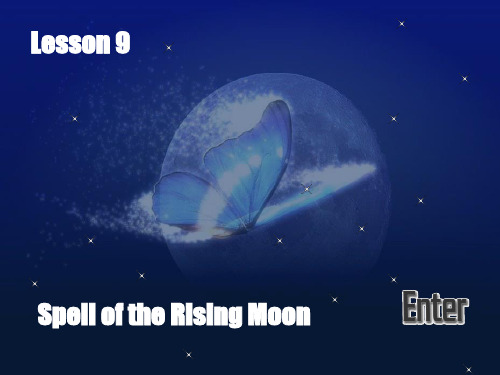
一个可怕的想法浮现在我的头脑中。 ② 一个可怕的想法浮现在我的头脑中。 A terrible thought loomed up in my mind.
Language Points
5. lift off go up from the ground into the air 升空 (line 1, para. 9) 还有十分钟火箭就要发射了。 ① 还有十分钟火箭就要发射了。 Ten minutes to go before the rocket lifts off. 飞机离开跑道起飞。 ② 飞机离开跑道起飞。 The plane lifted off the runway. *lift-off n. the time when a space vehicle goes up from the ground into the air 起飞,发射 起飞, 我们离地升空了。 我们离地升空了。 We have lift-off.
Language Points
1. wax: (line3, para. 4) a) (a formal or literary use) when the moon waxes, it grows larger(正式或雅)(月亮)渐满;(月)盈 )(月亮 ;(月 (正式或雅)(月亮)渐满;( b) wax: (mainly literary) become bigger or stronger 变大;增强; (雅)变大;增强;增加
Background Information
Many people seem to think that since the moon affects the ocean's tides, it must be so powerful that it affects the human body as well. The lunar force is actually a very weak tidal force. A mother holding her child "will exert 12 million times as much tidal force on her child as the moon". Also, the tidal force of the moon on the earth depends on its distance from earth, not its phase. Many believe in lunar myths because they have heard them repeated many times by members of the mass media, by police officers, nurses, doctors, social workers, and other people with influence.
研究生英语阅读教程unit 9
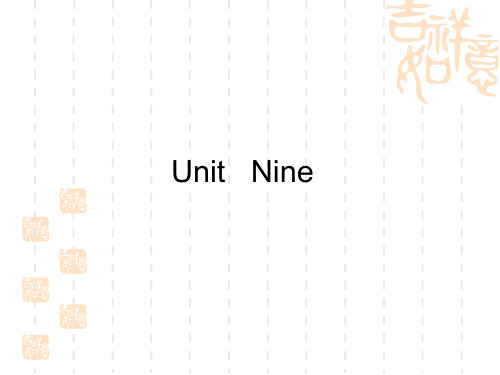
Part III The way to acquire information in internet-driven thought(7-13) 1. The importance of the ability to focus: this ability which is important than how much knowledge one possess (7-8) 2. the way to acquire knowledge A. the characteristics of internet knowledge and the ability required to sift useful information (9-10) B. The actual way to acquire knowledge: the canoe-building method(11-13)
Text A
We Need a Dug-out Canoe to Navigate the Net 乘上独木舟,畅游互联网
Structural analysis
Part I (para. 1—2): the two categories of thinkers and their way of thinking Questions 1) What are the two categories of thinkers according to Isaiah Berlin? 2) How are the two categories of thinkers differ from each other?
Point 3 Why is fox-thinking a direct threat to ideology?
专业学位硕士研究生英语教程Unit9词汇及课后答案
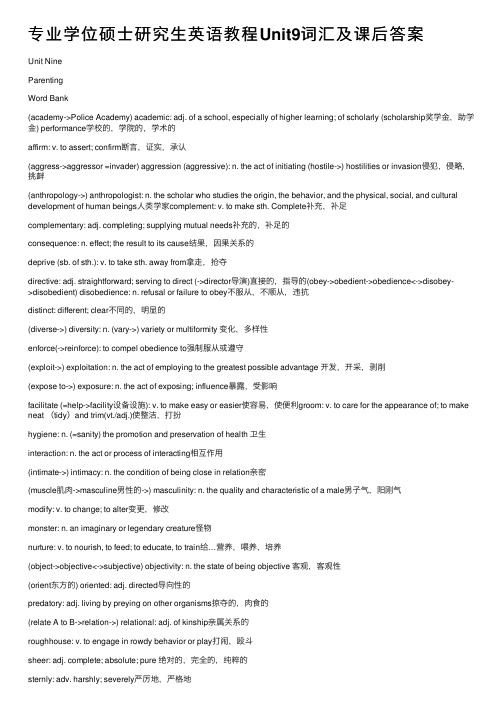
专业学位硕⼠研究⽣英语教程Unit9词汇及课后答案Unit NineParentingWord Bank(academy->Police Academy) academic: adj. of a school, especially of higher learning; of scholarly (scholarship奖学⾦,助学⾦) performance学校的,学院的,学术的affirm: v. to assert; confirm断⾔,证实,承认(aggress->aggressor =invader) aggression (aggressive): n. the act of initiating (hostile->) hostilities or invasion侵犯,侵略,挑衅(anthropology->) anthropologist: n. the scholar who studies the origin, the behavior, and the physical, social, and cultural development of human beings⼈类学家complement: v. to make sth. Complete补充,补⾜complementary: adj. completing; supplying mutual needs补充的,补⾜的consequence: n. effect; the result to its cause结果,因果关系的deprive (sb. of sth.): v. to take sth. away from拿⾛,抢夺directive: adj. straightforward; serving to direct (->director导演)直接的,指导的(obey->obedient->obedience<->disobey->disobedient) disobedience: n. refusal or failure to obey不服从,不顺从,违抗distinct: different; clear不同的,明显的(diverse->) diversity: n. (vary->) variety or multiformity 变化,多样性enforce(->reinforce): to compel obedience to强制服从或遵守(exploit->) exploitation: n. the act of employing to the greatest possible advantage 开发,开采,剥削(expose to->) exposure: n. the act of exposing; influence暴露,受影响facilitate (=help->facility设备设施): v. to make easy or easier使容易,使便利groom: v. to care for the appearance of; to make neat (tidy)and trim(vt./adj.)使整洁,打扮hygiene: n. (=sanity) the promotion and preservation of health 卫⽣interaction: n. the act or process of interacting相互作⽤(intimate->) intimacy: n. the condition of being close in relation亲密(muscle肌⾁->masculine男性的->) masculinity: n. the quality and characteristic of a male男⼦⽓,阳刚⽓modify: v. to change; to alter变更,修改monster: n. an imaginary or legendary creature怪物nurture: v. to nourish, to feed; to educate, to train给…营养,喂养,培养(object->objective<->subjective) objectivity: n. the state of being objective 客观,客观性(orient东⽅的) oriented: adj. directed导向性的predatory: adj. living by preying on other organisms掠夺的,⾁⾷的(relate A to B->relation->) relational: adj. of kinship亲属关系的roughhouse: v. to engage in rowdy behavior or play打闹,殴⽃sheer: adj. complete; absolute; pure 绝对的,完全的,纯粹的sternly: adv. harshly; severely严厉地,严格地(sym-=same; pathy=feeling)sympathy(sympathize with sb.): n. sharing thefeelings of another同情,同情⼼tickle: v. to touch (the body) lightly so as to cause laughter (笑声) or twitching movements; to tease or excite pleasurably使觉得痒,逗乐(timid=shy->) timidity (timidate=frighten): n. lack of confidence; fear 胆怯,羞怯: adv. orally; literally⼝头上地,⾔辞地wrestle: v. to contend by grappling and, attempting to throw摔跤Phrases and Expressionscope with: =deal with; to handle处理;应对due to: owing to由于have access (通道) to: to have the right to approach, or to make use of接近权;享⽤权in terms (术语, 学期) of: in relation to; with reference to根据;按照;就……⽽⾔settle (->settlement) down: to begin living a stable and orderly life; to become less nervous or restless安顿下来;平静Reading ComprehensionI. Choose the best for each of the following.1. How can fathers and mothers provide good things to children that same-sex caregivers cannot? ( D )A. By being adults in their children's lives.B. By depriving of the benefits found in mothers and fathersC. By differing parenting styles among people.D. By cooperating and complementing between mothers and fathers.2. According to Eleanor Maccoby, ___A__.A. fathers and mothers teach children differently in dealing with lifeB. fathers will not provide warm, nurturing care for an infantC. mothers teach children the difference between men and womenD. fathers have a distinct style of communication and interaction with children3. Children who roughhouse with their fathers ( A )A. learn that biting, kicking and other forms of physical violence are not acceptableB. learn self-controlC. are more physical and action orientedD. need mom's softness4. Which of the following can be categorized as "push limits"? ( D )A. Expanding experiences and confidence.B. Yelling "slow down, not so high, not so hard".C. Causing disagreement between mom and dad.D. Encouraging kids to climb higher, to ride faster.5. Girls with involved "married fathers" ( A )A. are more likely to have healthier relationships with malesB. build emotional security, and safety from other men and womenC. learn what masculinity isD. cope with life differentlyII. Complete the following (sum up求和-> summarize总结, 归纳) summary (⼩结)of the text by filling in the blanks with words. The initial letter of each word has been given to you.Children (1) benefit from a mother and father's differing (2) parenting styles. Mothers and fathers bring to their children (3) different values. They are different in their parenting styles, in the way they (4) play with children, and in their (5) communication with children. Fathers (6) provide a look at the world of men; mothers, the world of women. And by (7) cooperating together and complementing each other in their differences they provide good things that same-sex caregivers cannot. Children who have daily (8) access to the different and complementary ways of mothers and fathers will have (9) confidence, independence, and security. They are more likely to have a (10) healthy respect for both women and men as they grow into adulthood. VocabularyI. Choose the answer that best completes each sentence.1. She was ___A__ a normal childhood by the war.A. deprived ofB. taken awayC. given upD. got out2. Roses in a silver bowl ___B__ the handsome (beautiful) cherry table.A. comparisonB. complementC. competitionD. compensation3. Charles Darwin saw in the ___C__ of species (物种) the principles of (evolve->) evolution that operated to generate (=produce) the species: variation, competition and selection.A. (divide->) divisionB. (diverse->) diversionC. diversityD. (vary->) variation4. We (meet->) met on two __B___ occasions. One was an academic conference; the other a party.A. clearB. distinct (different)C. likely(possible)D. notable (obvious)5. The Internet, which covers the whole world, is increasing the __A___ of the people on the planet.A. interactionB. contractC. interplayD. interchange6. Most vegetables we buy in winter are __C___ in the greenhouse.A. natured (born to be)B. cultivated (->culture⽂化)C. nurtured (养育)D. nourished (提供营养)7. The students protested in front of American consulate (领事馆). They had no motives (动机) but those of ___B__ patriotism (爱国主义).A. absolute(绝对的)B. sheer (only纯粹的)C. pureD. complete8. The children ___A__ while (they are) building forts (要塞) with toy bricks (砖).A. roughhouse (fight)B. handleC. (pretense->)pretendD. behave9. The building is __D___ south and north.A. allocated (assign分配)B. guided (导游)C. operated (操纵)D. oriented (取…坐向)10. His (fail->) failure in business is largely due to __A__.A. timidity(胆怯)B. quality(质量)C. characteristics(特性特征)D. behavior (⾏为)II. Fill in the blanks with the words or phrases given below. Change the form where necessary.settle down facilitatemodify subtleconsequence verbally sympathy cope with academic instincthave/has access to sternlyaggression systematicallynurture1. Chinese national troops are on the alert against any possible aggression.2. This government has systematically taken actions to renew its economy.3. Most people have sympathy for the old lady for her (lose->lost->lost->) loss of the only son in the accident4. He is a (journal=magazine->) journalist (新闻⼯作者->journalism新闻学) whose subtle views on the hard issues of our time are rooted in a tough mind (heart) and5. I was (amuse逗⼈乐->) amazed (surprised) at her ability to cope with the difficult situation.6. He is one of the few scientists in this military base who have access to the restricted area.7. By the age of two most children have begun to communicate verbally (=orally).8. Modern devices such as micro-wave oven facilitate domestic work, and free (vt. set sb. free) people to have more (entertain->) entertainments (娱乐).9. This university is composed of five academic schools (department系).10. The industrial revolution modified (alter<->) the whole structure of English-speaking society.TranslationPut the following paragraph into English.在只有母亲或只有⽗亲的家庭⾥长⼤的孩⼦将会极⼤地缺乏⾃信、独⽴及安全感。
专业硕士英语教材第九章内容及翻译How to Deal with a Difficult Boss
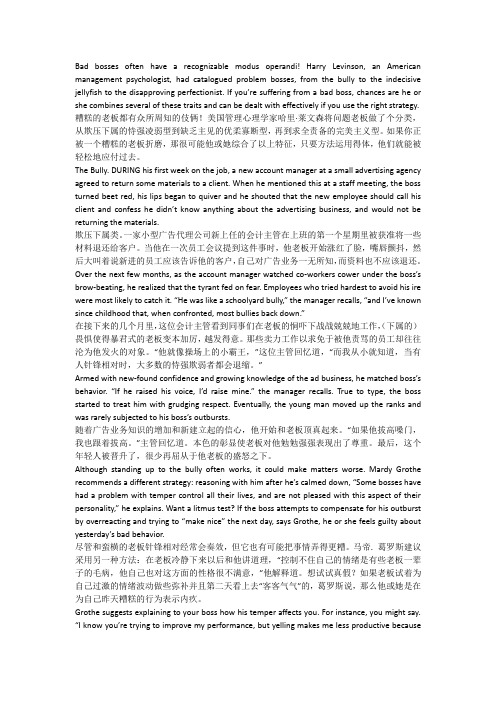
Bad bosses often have a recognizable modus operandi! Harry Levinson, an American management psychologist, had catalogued problem bosses, from the bully to the indecisive jellyfish to the disapproving perfectionist. If you’re suffering from a bad boss, chances are he or she combines several of these traits and can be dealt with effectively if you use the right strategy. 糟糕的老板都有众所周知的伎俩!美国管理心理学家哈里·莱文森将问题老板做了个分类,从欺压下属的恃强凌弱型到缺乏主见的优柔寡断型,再到求全责备的完美主义型。
如果你正被一个糟糕的老板折磨,那很可能他或她综合了以上特征,只要方法运用得体,他们就能被轻松地应付过去。
The Bully. DURING his first week on the job, a new account manager at a small advertising agency agreed to return some materials to a client. When he mentioned this at a staff meeting, the boss turned beet red, his lips began to quiver and he shouted that the new employee should call his client and confess he didn’t know anything about the advertising business, and would not be returning the materials.欺压下属类。
专业硕士英语教材第九章内容及翻译HowtoDealwithaDifficultBoss
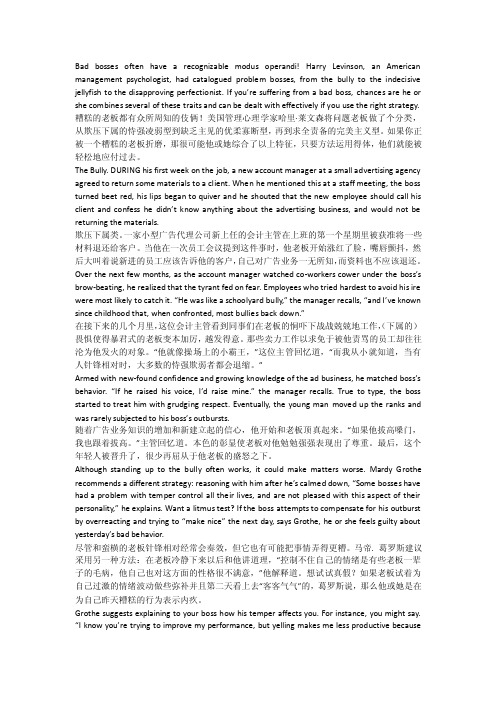
Bad bosses often have a recognizable modus operandi! Harry Levinson, an American management psychologist, had catalogued problem bosses, from the bully to the indecisive jellyfish to the disapproving perfectionist. If you’re suffering from a bad boss, chances are he or she combines several of these traits and can be dealt with effectively if you use the right strategy. 糟糕的老板都有众所周知的伎俩!美国管理心理学家哈里·莱文森将问题老板做了个分类,从欺压下属的恃强凌弱型到缺乏主见的优柔寡断型,再到求全责备的完美主义型。
如果你正被一个糟糕的老板折磨,那很可能他或她综合了以上特征,只要方法运用得体,他们就能被轻松地应付过去。
The Bully. DURING his first week on the job, a new account manager at a small advertising agency agreed to return some materials to a client. When he mentioned this at a staff meeting, the boss turned beet red, his lips began to quiver and he shouted that the new employee should call his client and confess he didn’t know anything about the advertising business, and would not be returning the materials.欺压下属类。
研究生英语阅读教程第三版课文lesson9
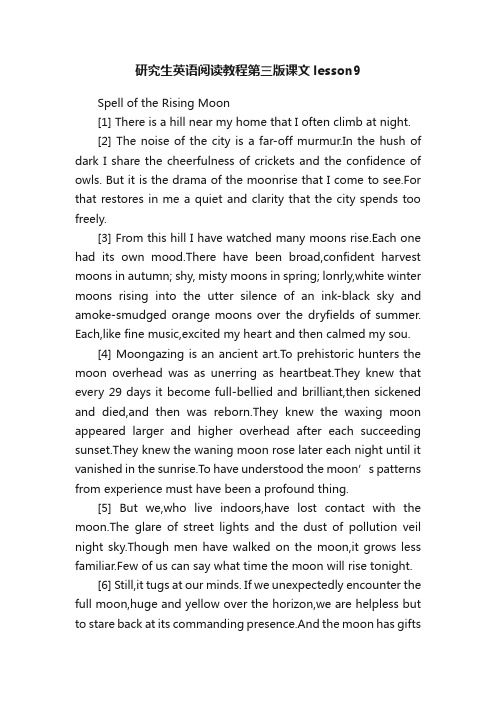
研究生英语阅读教程第三版课文lesson9Spell of the Rising Moon[1] There is a hill near my home that I often climb at night.[2] The noise of the city is a far-off murmur.In the hush of dark I share the cheerfulness of crickets and the confidence of owls. But it is the drama of the moonrise that I come to see.For that restores in me a quiet and clarity that the city spends too freely.[3] From this hill I have watched many moons rise.Each one had its own mood.There have been broad,confident harvest moons in autumn; shy, misty moons in spring; lonrly,white winter moons rising into the utter silence of an ink-black sky and amoke-smudged orange moons over the dryfields of summer. Each,like fine music,excited my heart and then calmed my sou.[4] Moongazing is an ancient art.To prehistoric hunters the moon overhead was as unerring as heartbeat.They knew that every 29 days it become full-bellied and brilliant,then sickened and died,and then was reborn.They knew the waxing moon appeared larger and higher overhead after each succeeding sunset.They knew the waning moon rose later each night until it vanished in the sunrise.To have understood the moon’s patterns from experience must have been a profound thing.[5] But we,who live indoors,have lost contact with the moon.The glare of street lights and the dust of pollution veil night sky.Though men have walked on the moon,it grows less familiar.Few of us can say what time the moon will rise tonight.[6] Still,it tugs at our minds. If we unexpectedly encounter the full moon,huge and yellow over the horizon,we are helpless but to stare back at its commanding presence.And the moon has giftsto bestow upon those who watch.[7] I learnede about its gifts on July evening in the mountains.My car had mysteriously stalled,andI was stranded and alone.The sun had set,and I was watching what seemed to be the bright-orange glow of a forest fire beyond a ridge to the east.Suddenly,the redge itself seemed to burst into flame.Then,the rising moon,huge and red and grotesquely misshapen by the dust and sweat of the summer atmosphere,loomed up out of the woods.[9] But as the moon lifted off the ridge it gathered firmness and authority.Its complexion changed from red,to orange,to gold,to impassive yellow.It seemed to draw light out of the darkening earth,for as it rose,the hills and calleys gerw dimmer.By the time the moon stood clear of the horizon,full chested and round and the color of ivory,the valleys were deep shadows in landscape in the landscape. The dogs,reassured that this was the familiar moon,stopped barking.And all at once I felt a confidence and joy close to laughter.[10]The drama took an hour Moonrise is slow and serried with subtleties.To watch it,we must slip into an older,more patient sense of time.To watch the moon move inexorably higher is to find an unusual stillness within ourselves.Our imaginations becomr aware of the vast diastances of space,the immensity of the earth and the huge improbability of our own exisrence.We fell small but privileged.[11] Moonlight shows us none of life’s harder edges.Hillsides seem silken and silvery,the oceans still and blue in its light.In moonlight we become less calculating,more drawn to our feeling. [12] And odd thing happen in such moments. On that July night,Iwatched the moon for an hour or two, and thengot back into the car,turned the key in the ignition and heard the engine start,just as mysteriously as it had stalled a few hours earlier.I drove down from the mountains with the moon on my shoulder and peace in my heart.[13] I return often to the rising moon.I am drawn especially when events crowd ease and clarity of vision into a small corner of my life.This happens often in the fall.Then I go to my hill and awaitthe hunter’s mo on,enormous and gold over the horizon,filling the night with vision.[14] An owl swoops from the ridgetop,noiseless but bright as flame.A cricket shrills in the grass.I think of poets and musicians.Of Beethoven’s “Moonlight Sonata”and of Shakespeare,whose Lorenzo declaim in Merchant of Venice, “How sweet the moonlight sleeps upon this bank!/Here will we sit and let the sounds of music/Creep in our ears.” I wonder if their verse and misic,like the music of crickets,are in some way voices of the moon,With such thoughts, my citified confusions melt into the quiet of the night.[15] Lovers and poets find deeper meaning at night. We are all apt to pose deeper questions –about our origins and destinies. We indulge in riddles,ranther than in the impersonal geometries rhat govern the daylit world.We become philosophers and mystics.[16] At moonrise,as we slow our minds to the heavens,enchantment steals over us.We open the vents of felling and exercise parts of our minds that reason locks away by day.We hear,across the distances,murmurs of ancient hunters and see anew the visions of poets and lovers of long ago.。
研究生英语综合教程上Unit 9
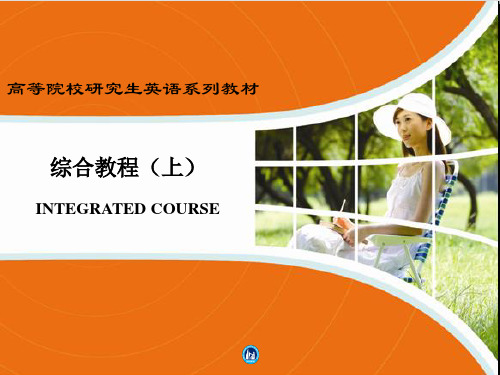
Starting out—Task 2
Task 2
People have a number of different reasons for choosing a particular area to live in. Compare the benefits and shortcomings of the following locations and decide where you’d like to live. You could add to the list.
Starting out—Task 1
Possible topics Location/ Size/ Interior decoration/ Electrical appliances/ Running water/ Hot water/ Showering or bathing facilities/ Indoor toilets/ Electric or gas stoves/ Refrigerators/ Central heating and/or air conditioning/ Lighting/ Telephone / Cable TV/ Internet access/ Housing cost—rent or ownership
高等院校研究生英语系列教材
综合教程(上)
INTEGRATED COURSE
Unit 9
Affordable Housing
Content
Starting out Reading Focus Reading More Practical Translation Focused Writing Final Project
Lao Wang and his wife live in a 15 m2 old apartment in downtown Shanghai. The area will be redeveloped in a couple of year’s time. They will be given 300,000 Yuan as compensation for their apartment and can either use the money to buy a house in the suburbs, or pay the developer 8,000 Yuan per square meter for a new 130 m2 downtown apartment which they will have to wait for five years before moving in.
专业型硕士研究生英语课文讲义unit 9

• • • • • • • •
rather than effective makeshift cobble together on the spur of creat scene semi-automatic
• • • • • • • •
tape liter at best... at worst jury-rigged worthless partially block overpressure
• • • •
threshold sound track reproduce stagger
• • • • • • •
insure member fire confined discharge cause temporary
• • • • • •
transfer define loudness in terms of output give a complete picture • outward
Textual organization
• Paragraph 2 and 3 are used as examples to tell the readers that what we see in movies may not necessarily be real from a physics point of view. • The function of Paragraph 4 is to give a scientific explanation of the actual situation related to the movie examples.
• • • • • • • •
figure moviemaker consistently artillery shell distant invariably simultaneously
研究生英语教程(上Unit 9 Affection and Friendship
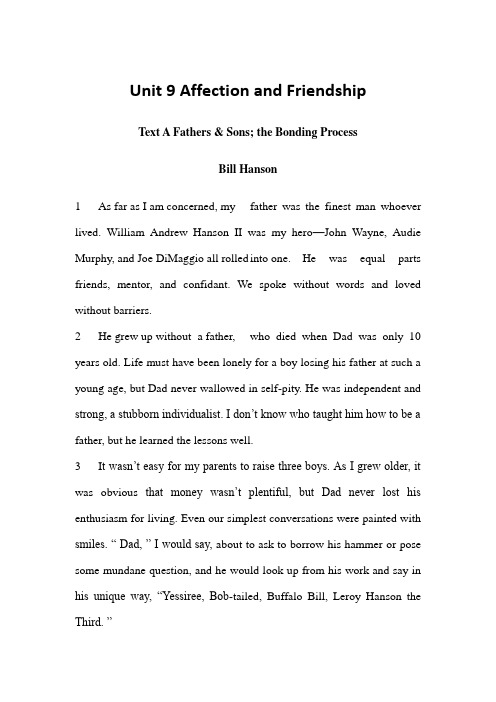
Unit 9 Affection and FriendshipText A Fathers & Sons; the Bonding ProcessBill Hanson1 As far as I am concerned, my father was the finest man whoever lived. William Andrew Hanson II was my hero—John Wayne, Audie Murphy, and Joe DiMaggio all rolled into one. He was equal parts friends, mentor, and confidant. We spoke without words and loved without barriers.2 He grew up without a father, who died when Dad was only 10 years old. Life must have been lonely for a boy losing his father at such a young age, but Dad never wallowed in self-pity. He was independent and strong, a stubborn individualist. I don‟t know who taught him how to be a father, but he learned the lessons well.3 It w asn‟t easy for my parents to raise three boys. As I grew older, it was obvious that money wasn‟t plentiful, but Dad never lost his enthusiasm for living. Even our simplest conversations were painted with smiles. “ Dad, ” I would say, about to ask to borrow his hammer or pose some mundane question, and he would look up from his work and say in his unique way, “Yessiree, Bob-tailed, Buffalo Bill, Leroy Hanson the Third. ”4 He had a real way with words and f instilled in me an appreciation and knowledge for language. If you asked him the ^meaning of a word, he could tell you ; the complete etymology of it. Sometimes , lessons came when I least expected them. In high school, I brought a date home to meet my father. Trying to impress her, or just being a teenager, I was sneering and being insulting to just about everyone in the room. Dad finally said, “Bill,I want you to go over to my dictionary and tell me what the word … sarcasm ‟ means. ” He said it in such a commanding tone, I didn‟t resist. I flipped open the page and found the literal meaning—to rip flesh. In one single moment, he taught me the power of words. I haven‟t forgotten it.5 The day he died was the hardest day of my life. My world had hinged on him. No person had loved me the way he did—unconditionally.I began to appreciate how lonely he must have been when his own father died. Without Dad, I thought the hope in me had died as well. Our friendship spoke to my soul, and now the conversation was over.6 Becoming a father myself wasn‟t high on my list of things to do. I had a sense that someday it would happen, but not in the immediate future. Dirty diapers and responsibilities were not my idea of a good time. Almost a decade after my father died, an infant changed my mind. His name is Miles Christopher Hanson.7 When I think about my life today, I see it as before child and afterchild. Being a father means there are new challenges for me. I mustbe prepared to meet obstacles I never knew existed and keep one step ahead of my growing boy‟s needs.8 There was no school degree to prepare me for fatherhood. I went to the bookstores and scoured the shelves for something that would give me a recipe for being a good father. I found nothing. Here I was, endeavoring to take on the biggest commitment of my life, and I had no lines, no textbook, no videos to tell me what to do. It was a job with no description. People would say to me, “Just love him. ” Loving was the easy part. Being a father was not.9 I was terrified the first time I held this small, pink, wrinkled bundle in my arms, the first time I gave him a bath, the first time we were alone together. All I could do was remember my own childhood and realize that my father had been my world. It was the best advice I found. Slowly, I began to re alize that I had been Miles‟ world. I just started taking my cues from him and we did okay together. In fact, now we are inseparable.10 If I am mowing the lawn, Miles mows the lawn. If I am reading the paper, Miles reads the paper. If I am thirsty, so is Miles. He is imitating my steps as I once copied my own father‟s. Here is the cycle of life. We learn from our n'i fathers so we can teach our children.11 Miles taught me that the hope my father had in abundance did not die with him. When I look at Miles, I know what my father saw inme—hope for a better future. I wish there were a way to share with my father his precious grandson. Fate didn‟t see it that way. My mother married again, and now both Miles and I benefit from a caring stepfather. We have developed a father and son bond based on love, mutual admiration, and respect. My stepfather has been there for me as father, friend, and counselor. He also had taught me that fathers and sons don‟t necessarily have to share flesh and bones. A father is someone who is willing to claim a son as his own and take the responsibility of that relationship. I am fortunate to have his influence in my life.12 Being a father (parent) is—let‟s face it—a pretty thankless job. In today‟s media, the only fathers we se e are the “deadbeat” dads. Where are the millions of men who toil day after day, sacrificing their own needs in order to fulfill the needs of theirfamily? Those men are out there, but there are no rewards. Think about it, when the cameras pan the sideline s at a sporting event, do you hear “Dad?” No—moms get all the credit.13 Over the years, I have taken pictures to salute the men who are raising the next generation of fathers. They are redefining what it is to be a father. I consider the relationship between mother and child equally significant. In fact, Miles has a great relationship with his mother, as I do with mine. Nevertheless, the photos are designed to encompass the relationship between father and son. As fathers, old expectations were toprotect, discipline, and provide for their offspring. Today, society expects and needs men to be more involved. Th e question is how.14 Each father and son team I have portrayed has found common ground in their relationship. Some fathers are in the wonderment phase—seeing the world through the eyes of their growing sons. Others are watching their sons cope with the demons of today. One or two fathers are discovering their sons. Some sons are fatherless, and some fathers are sonless. There are fathers who have watched their sons combat a fatal disease, others who have watched their sons grow into successful businessmen. Some of the fathers have been primary caregivers to their sons, while others have felt the pain of seeing their offspring grow up in a distant city because of divorce. One of the fathers talks of sharing the moment of winning a world championship title with his son, and another writes of reading Goose Bumps to his sons each evening. Fathers talk about newborns entering the world and about coaching Little League, of sons marrying and having their own sons, and of the passing of tradition. Each has taught by example and each has loved unconditionally.15 I hope that, through my photos, you will see men who are doing their best for their sons. You‟11 also see sons who are making their fathers proud—not because they are presidents, star athletes, millionaires, or celebrities, but because, at one point in history, a man had a son, and that son had a father who became his whole world. They learned fromeach other, laughed with each other, argued with each other, and loved. The bond between fathers and sons is unbreakable. It can be celebrated, cursed, strained, ridiculed, and honored. However, it can not be broken.(1330words)。
研究生英语高级教程(第二版)教学课件 Unit 9 The Global Food Crisis
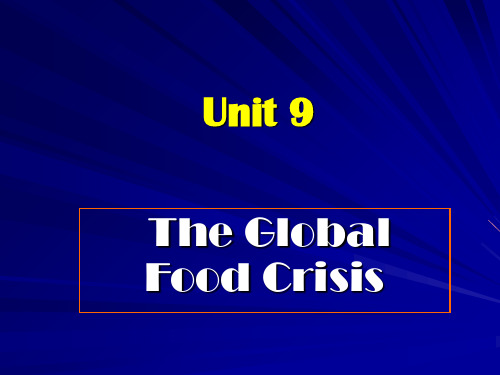
The Green Revolution allowed food production to enable, or keep pace with worldwide population growth. The Green Revolution has had major social and ecological impacts, making it a popular topic of study among sociologists. The term “Green Revolution” was first used in 1968 by former USAID director William Gaud, who noted the spread of the new technologies.
Green Revolution
Green Revolution (绿色革命)refers to the transformation of agriculture that began in 1945, largely due to the life work of Norman Borlaug. One significant factor in this revolution was the Mexican government’sural research station to develop more varieties of wheat that could be used to feed the rapidly growing population of the country.
Malthus has become widely known for his analysis according to which societal improvements result in population growth. The six editions of his Principles of Population, published from 1798 to 1826, observed that sooner or later population gets checked by famine, disease, and widespread mortality. He was writing against the popular view in 18th century Europe that saw society as improving, and in principle as perfectible. Malthus thought that the dangers of population growth would preclude endless progress towards a utopian society.
专业学位硕士研究生英语教程
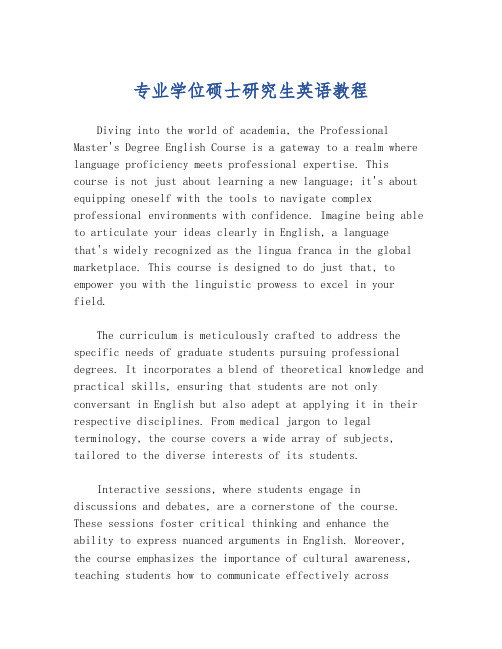
专业学位硕士研究生英语教程Diving into the world of academia, the Professional Master's Degree English Course is a gateway to a realm where language proficiency meets professional expertise. This course is not just about learning a new language; it's about equipping oneself with the tools to navigate complex professional environments with confidence. Imagine being able to articulate your ideas clearly in English, a languagethat's widely recognized as the lingua franca in the global marketplace. This course is designed to do just that, to empower you with the linguistic prowess to excel in your field.The curriculum is meticulously crafted to address the specific needs of graduate students pursuing professional degrees. It incorporates a blend of theoretical knowledge and practical skills, ensuring that students are not only conversant in English but also adept at applying it in their respective disciplines. From medical jargon to legal terminology, the course covers a wide array of subjects, tailored to the diverse interests of its students.Interactive sessions, where students engage in discussions and debates, are a cornerstone of the course. These sessions foster critical thinking and enhance theability to express nuanced arguments in English. Moreover, the course emphasizes the importance of cultural awareness, teaching students how to communicate effectively acrossdifferent cultures, a skill that is invaluable in today's interconnected world.The course also includes advanced writing workshops,where students learn to compose research papers, essays, and reports that adhere to the highest academic standards. With a focus on clarity, coherence, and persuasiveness, these workshops are designed to prepare students for the rigors of academic writing in English.In addition to classroom learning, the course offers a plethora of digital resources, including online modules, podcasts, and video lectures, which students can access attheir convenience. This flexibility allows for self-paced learning, catering to the busy schedules of graduate students.As you embark on this journey, you'll find that the Professional Master's Degree English Course is not just about mastering the language; it's about becoming a more effective communicator, a more knowledgeable professional, and a more global citizen. It's about unlocking the doors to new opportunities and stepping into a future where your voice, in English, can be heard loud and clear.。
- 1、下载文档前请自行甄别文档内容的完整性,平台不提供额外的编辑、内容补充、找答案等附加服务。
- 2、"仅部分预览"的文档,不可在线预览部分如存在完整性等问题,可反馈申请退款(可完整预览的文档不适用该条件!)。
- 3、如文档侵犯您的权益,请联系客服反馈,我们会尽快为您处理(人工客服工作时间:9:00-18:30)。
Unit Nine(Parents=mother and father)Parenting (=parental education)PreviewChildren do best when they have daily access to different and complementary parenting styles of mothers and fathers. Children growing up in mother-only or father-only homes may lack confidence, independence, and security. Such boys and girls will be vulnerable to gender confusion, abuse and exploitation from others. They are less likely to have a healthy respect for both women and men as they grow into adulthood.Part I Text ReadingWarm-upI.Ways to bring up a child.Raising a child is one of the hardest, most responsible and satisfying tasks a human being can face. It is also the job for which people receive the least formal training. Step oneDirections: Every parent wants his children to be well cultivated, but how to make it happen? Please cooperate with your partner to find ways for child cultivation. You can compare ways that your parents educated you. The following words and expressions may be useful for your discussion.Step twoDirections: If you were a parent, how would you raise your kids? Please discuss this topic with your desk mate. The following tips may be useful for the discussion.• Parents are role models.• Discipline is necessary.• Spending enough time with your children.• Good communication will teach children.II. What are fathers and mothers' ways to parent?Read the following phrases and guess parenting ways of fathers and mothers. Put F in the bracket for father's way and M for mother's.( ) 1. to provide warm, nurturing care for a crying infant( ) 2. to tickle, to wrestle, and to throw their children in the air( ) 3. to chase their children, as playful, scary "monsters"( ) 4. to encourage competition and independence( ) 5. to encourage equity and security( ) 6. to encourage their kids to swing or climb just higher( ) 7. to yell "slow down, not so high, not so hard"( ) 8. to simplify their words and speak on the child's level( ) 9. to be more brief, directive, and to the point( ) 10. to be more descriptive, personal and verbally encouragingTextWhy Children Need Father-Love and Mother-LoveGlenn T Stanton①[1] If Heather is being raised (=brought up) by two mommies (=mothers) and Brandon is being raised by Daddy (=Dad, Father) and his new husband-roommate,of (=are being denied of) the benefits (advantages) found invalue mothers and fathers bring to their children is due to (=because of) the fact that mothers and fathers are different. And by cooperating together and complementing each other in their differences, they provide (give) good things that same-sex caregivers cannot.Mothers and Fathers Parent (vt. educate) Differently[2] This difference provides an important (diverse->) diversity of experiences for children. Dr. Pruett explains that fathers have a distinct (=unique, different) style of (communicate->) communication and interaction with (互动) children. Infants (babies), by 8 weeks, can tell (know) the difference between a male or female interacting with them. Stanford psychologist Eleanor Maccoby, in her book The Two Sexes, explains mothers and fathers respond (->response) differently to infants. Mothers are more likely (=possible) to provide warm, nurturing (caring for and protect sb/sth while they are growing and developing) care for a crying infant. This diversity in itself provides children with a broader (wider), richer (colorful) experience of contrasting relational interactions—more so than for children who are raised by only one gender (sex). Whether they realize it or not, children are learning at earliest age, by sheer (=pure, only) experience, that men and women are different and have different ways of dealing with life, other adults and their children.Mothers and Fathers Play Differently[3] Fathers tend to play with, and mothers tend to care for, children. While both mothers and fathers are physical, fathers are physical in different ways.[4] Fathers tickle (to move your fingers on a sensitive part of sb's body in a way that makes them laugh) more, they wrestle (to fight sb by holding them and trying tothrow or force them to the ground, sometimes as a sport), and they throw their children in the air. Fathers chase (run after) their children, sometimes as playful, scary (frightening) "monsters." Fathers are louder at play, while mothers are quieter. Mothers cuddle (hug, embrace拥抱, to hold sb/ sth close in your arms to show love or affection) babies, and fathers bounce (push) them. Fathers roughhouse (to fight sb or play with sb roughly) while mothers are gentle (tender温柔的). One study found that 70 percent of father-infant games were more physical and action oriented② while only 4 percent of mother-infant play was like this. Fathers encourage (compete->) competition; mothers encourage (equal->) equity (a situation in which everyone is treated equally). One style encourages (independent->) independence while the other encourages (secure->) security.[5] Fathering expert John Snarey explains that children who roughhouse with their fathers learn that (bite->) biting, kicking and other forms of physical violence are not acceptable. They learn self-control by being told when "enough is enough" and when to (和解)." Girls and boys both learn a healthy balance between (timid->)(aggress->) aggression. Children need mom's softness as well as (and, together with) dad's roughhousing (violence). Both provide security and confidence in their own ways by communicating love and physical (intimate->) intimacy.Fathers Push (force sb. to challenge) Limits; Mothers Encourage Security[6] Go to any playground and listen to the parents. Who is encouraging their kids to swing or climb just a little higher, ride their bike just a little faster, throw just a little harder? Who is yelling, "slow down, not so high, not so hard!" Of course, fathers encourage children to take chances and push limits and mothers protect and are more (caution->) cautious. And this difference can cause disagreement between mom and dad on what is best for the child.[7] But the difference is essential (necessary,extremely important) for children. Either of these parenting styles by themselves can be unhealthy (harmful). One can tend toward encouraging risk without (consider->) consideration of consequences. The other tends to avoid risk, which can fail to build independence, confidence and progress. Joined together, they keep each other in balance and help children remain safe while expanding their experiences and confidence.Mothers and Fathers Communicate Differently[8] A major (main) study showed that when (they are) speaking to children, mothers and fathers are different. Mothers will simplify their words and speak on the child's level. Men are not as inclined (willing) to modify their language for the child.[9] Mother's way facilitates (=helps) immediate communication. Father's way challenges the child to expand her vocabulary and linguistic skills, an important building block (a piece of wood or plastic used as a toy for children to build things with 积木) of academic success.[10] Father's talk tends to be more brief, directive, and to the point. It also makesgreater use of (not very noticeable or obvious) body language and facial expressions. tend to be more (scribe滕文工->describe描述->)descriptive,personal and verbally (in spoken words and not in writing or actions) encouraging. Children who do not have daily exposure to (=experience) both will not learn how to understand and use both styles of conversation as they grow. These boys and girls will be at a disadvantage (处于劣势) because they will experience these different ways of communicating in relationships with teachers, bosses and other authority figures.[11] Educational psychologist Carol Gilligan tells us that fathers stress justice, fairness (=equality) and duty (based on rules), while mothers stress sympathy, care and help (based on relationships). Fathers tend to observe (obey) and enforce rules systematically and sternly (=strictly, seriously), which teach children the objectivity and consequences of right and wrong. Mothers tend toward grace (a quality of behavior that is polite and pleasant and deserves respect) and (among)sense of hopefulness. Again, either of these by themselves is not good, but together, they create a healthy, proper (appropriate or correct) balance.Fathers Provide a Look at (=a view of) the World of Men; Mothers, the World of Women[12] Men and women are different. They eat differently. They dress differently. They smell different. They groom (dress) themselves differently. They cope with (deal with) life differently. Fathers do "man things" and women do "lady things." Mothers and fathers both help little girls and little boys learn how to grow to be women and men. Anthropologist Suzanne Frayser explains this is constant (happening all the time or repeatedly) in all human societies, "Each process complements (to add to sth in a way that improves it or makes it more attractive) the other. The boy can look at his father and see what he should do to be a male; he can look at his mother and see what he should not do to be a male."[13] Girls and boys who grow up with a father are more familiar and secure with the curious (=strange and unusual) world of men. Girls with involved (积极参与社会活动), married fathers are more likely (possible) to have healthier relationships with boys in adolescence (the time in a person's life when he or she develops from a child into an adult, puberty青春期,青年) and men in adulthood because they learn from their fathers how proper (well-educated) men act toward women. This knowledge builds emotional security, and safety from the exploitation of predatory (using weaker people for their own financial or sexual advantage掠夺的, 食肉的) males③. They also learn from mom how to live in a woman's world. This is especially important as (when) they approach adolescence and all the changes that life-stage brings.[14] Boys who grow up with dads are much less likely to be violent. They have their masculinity affirmed (secured) and learn from their fathers how to channel (=direct) their masculinity and strength in positive ways. Fathers help children understand proper male sexuality, hygiene (sanity, the practice of keeping yourself and your living and working areas clean in order to prevent illness and disease卫生, 卫生学), and behavior in age appropriate ways. Mothers help boys understand the female world and develop a sensitivity (responsibility) toward women. They also help boys know how to relate and communicate with women.(conclude->)Conclusion[15] To be concerned with (worried about) proper children development is to be concerned about making sure that (=see to it that…确保…得以实现) children have daily access to the different and complementary ways mothers and fathers parent (act as parents). Children growing up in mother-only or father-only homes will suffer deeply in terms of lack of confidence, independence, and security. Such boys and girls will be at greater risk for gender confusion(性别带来的困惑或), abuse (=violence) and exploitation from other men. They are less likely to have a healthy respect for both women and men as (when) they grow into adulthood.Notes①Glenn T. Stanton: a researcher on family formation (structure). He debates and lectures extensively on the issues (problems) of gender, sexuality, marriage and parenting at universities and churches around the states. He is the author of three books and a contributor to five others, including Why Marriage Matters: Reasons to Believe in Marriage in Postmodern Society (1997) and My Crazy, Imperfect Christian Family.②. ... action oriented: involving rough behavior or play.③ ...the exploitation of predatory males: the aggressive behavior of males.Word Bank(academy->Police Academy) academic: adj. of a school, especially of higher learning; of scholarly (scholarship奖学金,助学金) performance学校的,学院的,学术的affirm: v. to assert; confirm断言,证实,承认(aggress->aggressor =invader) aggression (aggressive): n. the act of initiating (hostile->) hostilities or invasion侵犯,侵略,挑衅(anthropology->) anthropologist: n. the scholar who studies the origin, the behavior, and the physical, social, and cultural development of human beings人类学家complement: v. to make sth. Complete补充,补足complementary: adj. completing; supplying mutual needs补充的,补足的consequence: n. effect; the result to its cause结果,因果关系的deprive (sb. of sth.): v. to take sth. away from拿走,抢夺directive: adj. straightforward; serving to direct (->director导演)直接的,指导的(obey->obedient->obedience<->disobey->disobedient) disobedience: n. refusal or failure to obey不服从,不顺从,违抗distinct: different; clear不同的,明显的(diverse->) diversity: n. (vary->) variety or multiformity 变化,多样性enforce(->reinforce): to compel obedience to强制服从或遵守(exploit->) exploitation: n. the act of employing to the greatest possible advantage 开发,开采,剥削(expose to->) exposure: n. the act of exposing; influence暴露,受影响facilitate (=help->facility设备设施): v. to make easy or easier使容易,使便利groom: v. to care for the appearance of; to make neat (tidy)and trim(vt./adj.)使整洁,打扮hygiene: n. (=sanity) the promotion and preservation of health 卫生interaction: n. the act or process of interacting相互作用(intimate->) intimacy: n. the condition of being close in relation亲密(muscle肌肉->masculine男性的->) masculinity: n. the quality and characteristic of a male男子气,阳刚气modify: v. to change; to alter变更,修改monster: n. an imaginary or legendary creature怪物nurture: v. to nourish, to feed; to educate, to train给…营养,喂养,培养(object->objective<->subjective) objectivity: n. the state of being objective 客观,客观性(orient东方的) oriented: adj. directed导向性的predatory: adj. living by preying on other organisms掠夺的,肉食的(relate A to B->relation->) relational: adj. of kinship亲属关系的roughhouse: v. to engage in rowdy behavior or play打闹,殴斗sheer: adj. complete; absolute; pure 绝对的,完全的,纯粹的sternly: adv. harshly; severely严厉地,严格地(sym-=same; pathy=feeling)sympathy(sympathize with sb.): n. sharing the feelings of another同情,同情心tickle: v. to touch (the body) lightly so as to cause laughter (笑声) or twitching movements; to tease or excite pleasurably使觉得痒,逗乐(timid=shy->) timidity (timidate=frighten): n. lack of confidence; fear 胆怯,羞怯: adv. orally; literally口头上地,言辞地wrestle: v. to contend by grappling and, attempting to throw摔跤Phrases and Expressionscope with: =deal with; to handle处理;应对due to: owing to由于have access (通道) to: to have the right to approach, or to make use of接近权;享用权in terms (术语, 学期) of: in relation to; with reference to根据;按照;就……而言settle (->settlement) down: to begin living a stable and orderly life; to become less nervous or restless安顿下来;平静Reading ComprehensionI. Choose the best for each of the following.1. How can fathers and mothers provide good things to children that same-sex caregivers cannot?A. By being adults in their children's lives.B. By depriving of the benefits found in mothers and fathersC. By differing parenting styles among people.D. By cooperating and complementing between mothers and fathers.2. According to Eleanor Maccoby, _____.A. fathers and mothers teach children differently in dealing with lifeB. fathers will not provide warm, nurturing care for an infantC. mothers teach children the difference between men and womenD. fathers have a distinct style of communication and interaction with children3. Children who roughhouse with their fathersA. learn that biting, kicking and other forms of physical violence are not acceptableB. learn self-controlC. are more physical and action orientedD. need mom's softness4. Which of the following can be categorized as "push limits"?A. Expanding experiences and confidence.B. Yelling "slow down, not so high, not so hard".C. Causing disagreement between mom and dad.D. Encouraging kids to climb higher, to ride faster.5. Girls with involved "married fathers"A. are more likely to have healthier relationships with malesB. build emotional security, and safety from other men and womenC. learn what masculinity isD. cope with life differentlyII. Complete the following (sum up求和-> summarize总结, 归纳) summary (小结) of the text by filling in the blanks with words. The initial letter of each word has been given to you.Children (1) benefit from a mother and father's differing (2) parenting styles. Mothers and fathers bring to their children (3) different values. They are different in their parenting styles, in the way they (4) play with children, and in their (5) communication with children. Fathers (6) provide a look at the world of men; mothers, the world of women. And by (7) cooperating together and complementing each other in their differences they provide good things that same-sex caregivers cannot. Children who have daily (8) access to the different and complementary ways of mothers and fathers will have (9) confidence, independence, and security. They are more likely to have a (10) healthy respect for both women and men as they grow into adulthood. VocabularyI. Choose the answer that best completes each sentence.1. She was _____ a normal childhood by the war.A. deprived ofB. taken awayC. given upD. got out2. Roses in a silver bowl _____ the handsome (beautiful) cherry table.A. comparisonB. complementC. competitionD. compensation3. Charles Darwin saw in the _____ of species (物种) the principles of (evolve->) evolution that operated to generate (=produce) the species: variation, competition and selection.A. (divide->) divisionB. (diverse->) diversionC. diversityD. (vary->) variation4. We (meet->) met on two _____ occasions. One was an academic conference; the other a party.A. clearB. distinct (different)C. likely(possible)D. notable (obvious)5. The Internet, which covers the whole world, is increasing the _____ of the people on the planet.A. interactionB. contractC. interplayD. interchange6. Most vegetables we buy in winter are _____ in the greenhouse.A. natured (born to be)B. cultivated (->culture文化)C. nurtured (养育)D. nourished (提供营养)7. The students protested in front of American consulate (领事馆). They had no motives (动机) but those of _____ patriotism (爱国主义).A. absolute(绝对的)B. sheer (only纯粹的)C. pureD. complete8. The children _____ while (they are) building forts (要塞) with toy bricks (砖).A. roughhouse (fight)B. handleC. (pretense->)pretendD. behave9. The building is _____ south and north.A. allocated (assign分配)B. guided (导游)C. operated (操纵)D. oriented (取…坐向)10. His (fail->) failure in business is largely due to ___.A. timidity(胆怯)B. quality(质量)C. characteristics(特性特征)D. behavior (行为)II. Fill in the blanks with the words or phrases given below. Change the form where necessary.settle down facilitatemodify subtleconsequence verbally sympathy cope with academic instincthave/has access to sternlyaggression systematicallynurture1. Chinese national troops are on the alert against any possible aggression.2. This government has systematically taken actions to renew its economy.3. Most people have sympathy for the old lady for her (lose->lost->lost->) loss of the only son in the accident4. He is a (journal=magazine->) journalist (新闻工作者->journalism新闻学) whose subtle views on the hard issues of our time are rooted in a tough mind (heart) and逗人乐->) amazed (surprised) at her ability to cope with the difficult situation.6. He is one of the few scientists in this military base who have access to the restricted area.7. By the age of two most children have begun to communicate verbally (=orally).8. Modern devices such as micro-wave oven facilitate domestic work, and free (vt. set sb. free) people to have more (entertain->) entertainments (娱乐).9. This university is composed of five academic schools (department系).10. The industrial revolution modified (alter<->) the whole structure of English-speaking society.TranslationPut the following paragraph into English.在只有母亲或只有父亲的家庭里长大的孩子将会极大地缺乏自信、独立及安全感。
